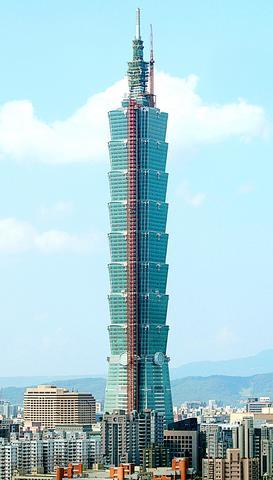The Taipei 101 office building laid claim to the title of the world's tallest skyscraper following a ceremony yesterday to position a 60m spire on top of the structure.
With the addition of the spire, the building boasts of a full height of 508m, eclipsing Malaysia's Petronas Twin Towers, a company executive said yesterday.
"We believe that Taipei 101 will bring a fresh taste to Taipei's skyline," said Lin Hong-ming (

PHOTO: REUTERS
Lin hopes the landmark, though still under construction, will attract more tenants in the Hsinyi district.
Though the leasing of office space is still in its initial stages, Lin expects about 80 percent of the 60,000 ping at Taipei 101 will be leased within 18 months.
"What concerns our potential tenants is how to earn more money after moving into Taipei 101 [with around-the-clock services] rather than saving money through lower rentals," Lin said.
Jones Lang LaSalle Taiwan, the primary leasing agent for the Taipei 101 tower, is not sure about the leasing prospects, however.
"We're seeking the right price and right tenants, who will have long-term occupancies. We're not in a rush," Matthew Shaw, director of Jones Lang LaSalle Taiwan, told the Taipei Times.
Property-market watchers said that slow corporate spending, a lukewarm office market, an increasing supply of office space and high rental rates charged by the Taipei Financial Center could dash the company's hopes.
"Eighty-percent occupancy is an aggressive target. I doubt many potential tenants are available now as big international companies such as Hewlett-Packard Co and IBM Corp just signed new lease contracts for new offices in the area," said Derek Huang (
Though Taiwan's economy is showing signs of recovery, the resilience has not extended to the office market, Huang added.
Carol Su (
For the moment, corporate CEOs are unlikely to rent luxury offices, Su said.
Another factor that could slow Taipei 101's leasing progress is the impact of the Sept. 11, 2001, attack on the twin towers in New York. Su said the attacks appear to have dampened multinational corporations' interest in skyscrapers.
A growing supply of office space in the Neihu and Nankang districts also put the leasing plan in trouble as those offices are attractive to companies looking for lower rental rates, Huang said.
Rents are about NT$1,100 per ping per month and NT$600 per ping per month in the Neihu and Nankang areas, respectively, according to Huang.
The rents will range from NT$3,000 to NT$4,000 per ping for tenants of Taipei 101, an official at the Taiwan Stock Exchange, one of the skyscraper's major shareholders and future tenants, said last month.

Taiwan is projected to lose a working-age population of about 6.67 million people in two waves of retirement in the coming years, as the nation confronts accelerating demographic decline and a shortage of younger workers to take their place, the Ministry of the Interior said. Taiwan experienced its largest baby boom between 1958 and 1966, when the population grew by 3.78 million, followed by a second surge of 2.89 million between 1976 and 1982, ministry data showed. In 2023, the first of those baby boom generations — those born in the late 1950s and early 1960s — began to enter retirement, triggering

ECONOMIC BOOST: Should the more than 23 million people eligible for the NT$10,000 handouts spend them the same way as in 2023, GDP could rise 0.5 percent, an official said Universal cash handouts of NT$10,000 (US$330) are to be disbursed late next month at the earliest — including to permanent residents and foreign residents married to Taiwanese — pending legislative approval, the Ministry of Finance said yesterday. The Executive Yuan yesterday approved the Special Act for Strengthening Economic, Social and National Security Resilience in Response to International Circumstances (因應國際情勢強化經濟社會及民生國安韌性特別條例). The NT$550 billion special budget includes NT$236 billion for the cash handouts, plus an additional NT$20 billion set aside as reserve funds, expected to be used to support industries. Handouts might begin one month after the bill is promulgated and would be completed within

NO CHANGE: The TRA makes clear that the US does not consider the status of Taiwan to have been determined by WWII-era documents, a former AIT deputy director said The American Institute in Taiwan’s (AIT) comments that World War-II era documents do not determine Taiwan’s political status accurately conveyed the US’ stance, the US Department of State said. An AIT spokesperson on Saturday said that a Chinese official mischaracterized World War II-era documents as stating that Taiwan was ceded to the China. The remarks from the US’ de facto embassy in Taiwan drew criticism from the Ma Ying-jeou Foundation, whose director said the comments put Taiwan in danger. The Chinese-language United Daily News yesterday reported that a US State Department spokesperson confirmed the AIT’s position. They added that the US would continue to

The National Development Council (NDC) yesterday unveiled details of new regulations that ease restrictions on foreigners working or living in Taiwan, as part of a bid to attract skilled workers from abroad. The regulations, which could go into effect in the first quarter of next year, stem from amendments to the Act for the Recruitment and Employment of Foreign Professionals (外國專業人才延攬及僱用法) passed by lawmakers on Aug. 29. Students categorized as “overseas compatriots” would be allowed to stay and work in Taiwan in the two years after their graduation without obtaining additional permits, doing away with the evaluation process that is currently required,